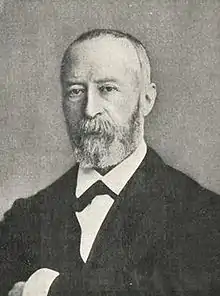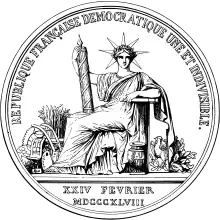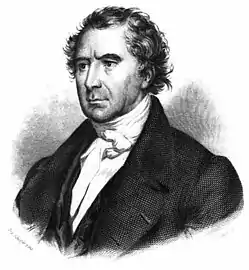Charles Duclerc
Charles Théodore Eugène Duclerc (French: [ʃaʁl dyklɛʁ]; 7 August 1812, Bagnères-de-Bigorre – 29 January 1888) was a French journalist and politician of the Third Republic.[1] He was a member of the editorial board of the National newspaper.[2] Duclerc served as Minister of Finance from May through June in the Provisional government of France.[3] Later served as prime minister from 1882 to 1883 in the third Republic.
Charles Duclerc | |
|---|---|
 | |
| Prime Minister of France | |
| In office 7 August 1882 – 29 January 1883 | |
| President | Jules Grévy |
| Preceded by | Charles de Freycinet |
| Succeeded by | Armand Fallières |
| Personal details | |
| Born | 9 November 1812 |
| Died | 21 July 1888(1888-07-21) (aged 75) |
| Political party | Opportunist Republicans |
Duclerc was born in Bagnères-de-Bigorre and he died in Paris.
Duclerc's Ministry, 7 August 1882 – 29 January 1883
- Charles Duclerc – President of the Council and Minister of Foreign Affairs
- Jean-Baptiste Billot – Minister of War
- Armand Fallières – Minister of the Interior
- Pierre Tirard – Minister of Finance
- Paul Devès – Minister of Justice and Worship
- Jean Bernard Jauréguiberry – Minister of Marine and Colonies
- Jules Duvaux – Minister of Public Instruction and Fine Arts
- François de Mahy – Minister of Agriculture
- Anne Charles Hérisson – Minister of Public Works
- Adolphe Cochery – Minister of Posts and Telegraphs
- Pierre Legrand – Minister of Commerce
Changes
- 13 September 1882 – Armand Fallières succeeds Devès as Minister of Worship. Fallières remains Interior Minister, and Devès Minister of Justice.
References
- Biographical note contained in the Collected Works of Karl Marx and Frederick Engels: Volume 10 (International Publishers: New York, 1978) p. 717
- Biographical note contained in the Collected Works of Karl Marx and Frederick Engels: Volume 10, p. 717.
- Biographical note contained in the Collected works of Karl Marx and Frederick Engels: Volume 10, p. 717.
French Provisional Government of 1848 (24 February 1848 to 9 May 1848) | ||
|---|---|---|
| President of the Council | ||
| Interior | ||
| Foreign Affairs | ||
| Finance |
| |
| Justice | ||
| Public Works | ||
| Agriculture and Commerce | ||
| Education and Religious Affairs | ||
| Navy and Colonies | François Arago, Sub-secretary Victor Schœlcher | |
| War | ||
| Other members | ||
French Executive Commission of 1848 (9 May 1848 to 24 June 1848) | ||
|---|---|---|
| Commissioners |
| |
| Interior |
| |
| Foreign Affairs |
| |
| Finance | ||
| Justice | ||
| Public Works | ||
| Agriculture and Commerce | ||
| Religious Affairs | ||
| Public Education |
| |
| War | ||
| Navy and Colonies |
| |
| |
| House of Valois (1518–1589) |
|
| House of Bourbon (1589–1792) |
|
| First Republic (1792–1804) |
|
| House of Bonaparte (1804–1814) |
|
| House of Bourbon (1814–1815) |
|
| House of Bonaparte (1815) |
|
| House of Bourbon (1815–1830) |
|
| House of Orléans (1830–1848) |
|
| Second Republic (1848–1852) |
|
| House of Bonaparte (1852–1870) | |
| Third Republic (1870–1940) |
|
| Vichy France (1940–1944) |
|
| Free France (1941–1944) |
|
| Provisional Government (1944–1946) | |
| Fourth Republic (1946–1958) |
|
| Fifth Republic (1958–present) |
|
Authority control databases | |
|---|---|
| International | |
| National | |
| People | |
| Other | |
This article is issued from Wikipedia. The text is licensed under Creative Commons - Attribution - Sharealike. Additional terms may apply for the media files.


